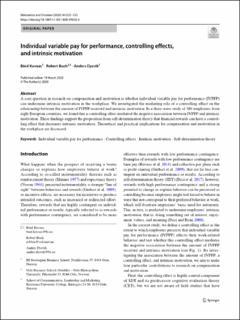| dc.contributor.author | Kuvaas, Bård | |
| dc.contributor.author | Buch, Robert | |
| dc.contributor.author | Dysvik, Anders | |
| dc.date.accessioned | 2021-09-17T15:38:43Z | |
| dc.date.available | 2021-09-17T15:38:43Z | |
| dc.date.created | 2020-03-10T13:57:38Z | |
| dc.date.issued | 2020 | |
| dc.identifier.citation | Motivation and Emotion. 2020, 44, 525-533. | en_US |
| dc.identifier.issn | 0146-7239 | |
| dc.identifier.uri | https://hdl.handle.net/11250/2778961 | |
| dc.description.abstract | A core question in research on compensation and motivation is whether individual variable pay for performance (IVPFP) can undermine intrinsic motivation in the workplace. We investigated the mediating role of a controlling effect on the relationship between the amount of IVPFP received and intrinsic motivation. In a three-wave study of 304 employees from eight European countries, we found that a controlling effect mediated the negative association between IVPFP and intrinsic motivation. These findings support the proposition from self-determination theory that financial rewards can have a controlling effect that decreases intrinsic motivation. Theoretical and practical implications for compensation and motivation in the workplace are discussed. | en_US |
| dc.language.iso | eng | en_US |
| dc.publisher | Springer | en_US |
| dc.rights | Navngivelse 4.0 Internasjonal | * |
| dc.rights.uri | http://creativecommons.org/licenses/by/4.0/deed.no | * |
| dc.title | Individual Pay for Performance, Controlling Effects, and Intrinsic Motivation | en_US |
| dc.type | Journal article | en_US |
| dc.type | Peer reviewed | en_US |
| dc.description.version | publishedVersion | en_US |
| dc.source.pagenumber | 525-533 | en_US |
| dc.source.volume | 44 | en_US |
| dc.source.journal | Motivation and Emotion | en_US |
| dc.identifier.doi | 10.1007/s11031-020-09828-4 | |
| dc.identifier.cristin | 1800903 | |
| cristin.ispublished | true | |
| cristin.fulltext | original | |
| cristin.qualitycode | 1 | |

